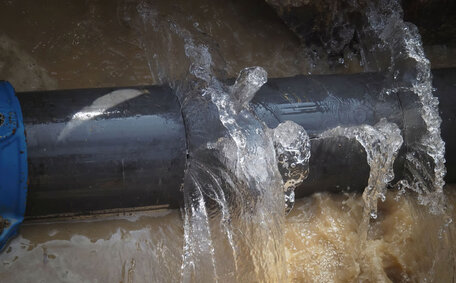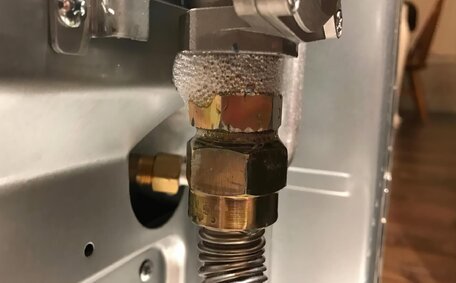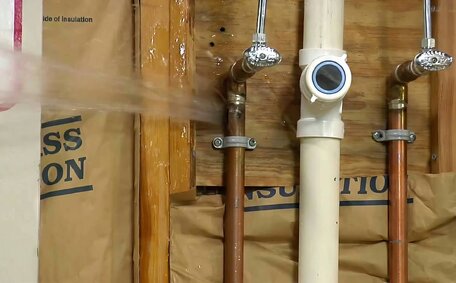Introduction: What causes noisy hot water systems?
Noisy water heaters may indicate issues requiring immediate attention.
Typical issues are sediment buildup causing rattling, water hammer from pressure changes, and corrosion leading to premature wear and noise.
Knowing the reasons for noise in your heater assists in deciding between a simple fix, like adjusting water pressure, and needing professional repair for more severe issues. Detecting unexpected heater noises early helps maintain system efficiency and longevity.
This guide explores common causes of noise in water heaters, identifies sounds, outlines troubleshooting techniques, provides maintenance advice, and advises when to engage a licenced plumber to avoid costlier damage.
Identifying the Type of Noise
Identifying specific noises from your hot water system can offer essential clues for plumbing maintenance. Here are some of the water heater noises you’re most likely to encounter:
- Loud banging or hammering: This typically signals water hammering, a scenario where your plumbing system is producing noise due to sudden taps shut-off, sending a pressure wave through the pipes.
- Hissing: Indicates a leak of gas or water, especially if new and accompanied by a drop in water pressure.
- Popping or rumbling: Usually caused by water bubbles, sediment accumulation, or a worn-out heating element.
- Screeching: Suggests internal components like valves or pipes are loose and rattling around.
When a new noise occurs, note its sound, affected outlets, triggers, and other observations. This detailed information helps diagnose the underlying cause so problems can be rectified before expensive damages occur.
Initial troubleshooting for your hot water heater includes checking valve tightness, inspecting for leaks, and activating heating/pressure relief valves to determine if limescale or sediment buildup can make noises in the water flow. However, if the noise indicates major internal or structural damage, such as noisy pipes, only a professional can fix problem areas without making the water running issues worse - a qualified plumber should promptly assess these systems.
Sediment Buildup
Sediment buildup over time in hot water pipes is a usual suspect for disturbing popping noises. As all water runs through the pipes and tank, mineral deposits, rust flakes and other debris build up at the bottom. This buildup accumulates along the bottom water tank, forming water sediments, slowly reducing efficiency and heating capacity.
To prevent sediment accumulation, it’s recommended to This process involves draining sediment from the tank through the bottom valve or the hot water tap outlets. For safety, turn off the water supply using the main shutoff valve before proceeding.
After draining, open your taps to clear residual sediment.
If your system already makes loud noises suggesting excessive debris, flushing may not suffice. An inspection by a qualified plumber is necessary if sediment exceeds what a simple flush can remedy. They can assess if replacement is necessary to stop ongoing rattling issues.
Water Hammering
Water hammering in your pipes when your plumbing system comprises occurs when water pressure spikes from the sudden stopping of fast-flowing water in pipes. As taps are abruptly turned off water, the momentum causes pipelines to shake violently, creating a loud banging or hammering noise.
Ideal household water pressure ranges between 45-80 PSI. Readings consistently over 80 PSI suggest a high risk of water hammer in your plumbing. Abruptly shutting off hot water increases flow speed, intensifying the impact against pipe interiors.
To fix water hammer, regulate water pressure with pressure reducing valves. Additional air chambers and water hammer arrestor can also help absorb shock, smoothing the water flow. Call a plumber to assess the system for leaks or loose fixtures and modify pressure as needed if other fixes are ineffective.
Loose Parts
Loose parts like bolts, fittings and washers inside a hot water system are often the culprits behind pipes making rattling or screeching noises as water flows through. As components shake around, they vibrate against internal pipes producing high-pitched sounds.
To check for looseness, start by carefully inspecting the external water heater casing and all connected pipes for any visibly loose fittings that may need tightening. Taps and check valves should also be inspected to ensure nothing is loose and causing noise in your heater then.
However, entering the internals of your heater tank can be extremely dangerous and is best left to your plumber if handled improperly by untrained persons. If noises persist despite external checks, contact a licenced plumber for comprehensive inspection and repair to safely secure all internal fixtures.
Leaks and Condensation
Leaks and condensation can lead to distinctive noises, as pipes react to drips or steam. Listen for new hissing sounds that may indicate a water leak from the water tank. Also, there no signs of leakage or condensation buildup, check for water puddles under the hot water unit, rust streaks on the side, or beads of moisture forming on pipes.
Some condensation is standard, but excessive moisture indicates a more severe problem. Condensation dripping inside the tank can also make sizzling or popping noises.
If you notice leaks or condensation, shut off the water supply at once and contact a plumber for an inspection and repair to avert major damages. Left unchecked, this moisture buildup promotes corrosion, floods, mould risks and potential water heater failure.
Troubleshooting Strategies for Noisy Hot Water Systems
Take notes on precisely when, where and under what conditions the noise occurs. This establishes an informative baseline.
Start troubleshooting with these steps:
- Checking externally visible valves, pipes and connections for looseness and tightening fittings as needed
- Inspecting for leaks, rust streaks or water puddles suggesting leakage
- Ensure water pressure adheres to the 45-80 PSI guidelines with an in-line pressure gauge, essential for high-demand appliances like washing machines
- Manually activating the temperature and pressure relief valve to clear potential blockages
- Draining water from the lowest hot tap to flush sediment from your water tank
If tapping the unit stops the noise, sediment likely rattles inside. Annual flushing is a preventive measure that helps the heater to heat up more effectively. However, excess buildup requires professional descaling.
For persistent banging noises despite plumbing work, installing water hammer arrestors can fix noisy disruptions when water heater pressure spikes occur. If ineffective, modifying home water pressure may be necessary.
Though minor actions can dismiss basic issues, new noises often need a professional inspection. Continued rattling risks accelerated wear, energy wastage and even tank failure if left unchecked.
Draining and Flushing Hot Water Systems
Draining and flushing your hot water system every 6-12 months answers the question of 'Why my hot water system has sediment buildup that can lead to popping noises when water heats rapidly over time’. Here are the steps to safely drain it:
- Turn off the electric water heater power at the main switchboard
- Shut off the water supply at the main shut off valve
- Open the closest hot water tap to allow air in and let water flow out of the tank from the drain valve
- Attach a garden hose to the drain valve spout to direct water through a water pipe outside rather than spilling over the floors of your house
- Open the pressure relief valve using the lever at the top of your tank; this allows air inside to force water out
- Once water runs clear with no debris, close all taps and turn water supply back on
- Refill system completely to ensure you get back hot water before restoring power to the water heater
Draining sediment can result in extended system’s life expectancy. However, flushing alone may be insufficient if scale buildup is already causing significant rattling noises from inside the tank. In those instances, inspection by our qualified plumbers determines if professional descaling or replacement is necessary.
Checking Water Pressure and Pressure Relief Valve
Use an affordable water pressure gauge on an outdoor tap to check pressure levels against the recommended range.
Also, annually inspect the pressure relief valve at the water heater’s top tank. This valve is located near the top of the tank and has a lever that can manually release pressure. Briefly pull the lever down to ensure water comes out, relieving built-up pressure properly. This extends the system’s lifespan.
If unsure about handling these components, have Randwick Plumbing’s licenced technicians check the water your home’s pressure and pressure relief valve instead. Adjusting these elements requires expertise to avoid risks and ensure optimal function.
Pipe Inspection
Visually inspect all your pipes connected to the hot water system, checking for signs of damage like cracks or leaks that could cause noises. Look for sections where pipes lack support from broken or missing pipe straps, causing them to rattle when water flows.
Check where pipes penetrate walls or floors for potential noise issues. The gaps around them may have loosened over time, enabling vibrations to transfer and cause banging noises within your walls. Have an inspection scope inserted into pipes to check for obstructions like tree roots, especially common around the Randwick area.
If You can now contact Randwick Plumbing for a thorough assessment if you notice any of these pipe abnormalities. Our qualified technicians will identify concerning issues, advise on repair options and prevent further noise problems.
Updating Minor Components
Minor components in your hot water system may wear out or corrode over time. Loose fittings, ageing washers, faulty heat trap nipples, and depleted anode rods are common replacements to stop rattling noises.
Replacing these affordable parts can extend your system’s lifespan and forestall full replacement needs. Have spare washers, heat traps and anode rods on hand for quick fixes. Randwick Plumbing also stocks essential spares to swap out during routine maintenance.
While noises from your water heater often indicate sediment buildup needing a flush, don’t overlook examining consumable pieces for damage first. If unsure about replacing internal fixtures, our qualified technicians can inspect tanks and update components appropriately.
When to Call a Professional Plumber
Consult a professional plumber if unusual noises persist or suggest complex issues.
Randwick Plumbing’s qualified technicians have the expertise and know-how to fix thoroughly all components, diagnose problems precisely, and remedy concerning noises appropriately. We handle all makes and models of heaters to get your system running quietly and efficiently again.
Call us right away if you notice any of these scenarios:
- Loud banging or hammering sounds signalling potential water hammer issues
- Persistent rumbling or vibrating from a heavily sedimented unit
- New hissing that suggests a problematic gas or water leak
- Internal components seem to be rattling loose
- The noise worsens or occurs alongside other performance problems
- Basic troubleshooting and maintenance steps had no effect
Our round-the-clock emergency plumbing service swiftly sends expert technicians to examine your piping system for unusual noises. We provide upfront quotes and ensure work complies with all Australian standards for quality, safety and reliability.
For expert help in pinpointing noise sources in your hot water system, promptly call Randwick Plumbing at 1300 349 338.
Conclusion: Preventive Maintenance Is Key
Being attentive and proactive with preventive maintenance helps minimise unpleasant noises while extending your hot water system’s lifespan, as well-maintained pipes could remain noise-free for years. Simple annual steps like flushing sediment or updating washers, combined with regular inspections by Randwick Plumbing’s qualified technicians, keep components running optimally for up to 15 years.
We recommend contacting Randwick Plumbing to learn more about establishing an annual maintenance plan tailored to your specific model and household needs. Our expertise pinpoints small issues before they escalate into major repair bills down the line. Investing in minor part replacements also cost less than full system replacement if severe damage occurs.
Don’t overlook strange noises expecting them to fix themselves - early intervention prevents more intensive repairs later. Randwick Plumbing promises reliable solutions to restore the soothing silence you expect from a high-performing hot water system.
For superior hot water heater repair maintenance or responsive repairs, call our friendly team on 1300 349 338. We service all major brands, providing transparent quotes and quality workmanship guaranteed.






